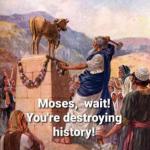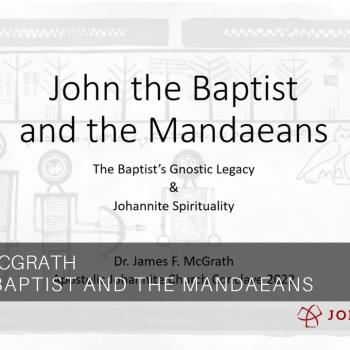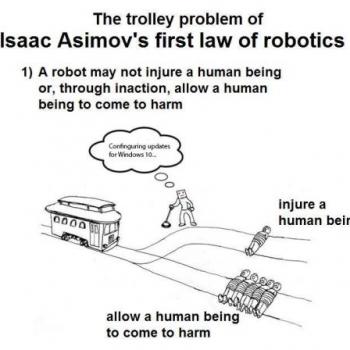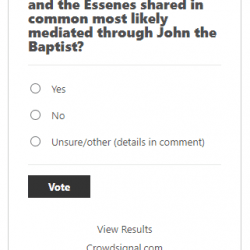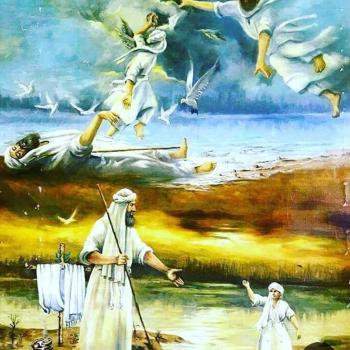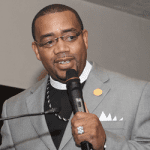Here is my recap of the first day of the first ever Enoch Seminar meeting held completely online, which began yesterday. The first day began with opening ceremonies that offered a retrospective going back to the early 1970s with Bob Kraft’s seminar focused on the pseudepigrapha and the publication of Jewish pseudepigrapha that had been previously largely ignored by academics working in both ancient Judaism and early Christianity. John Collins and Amy-Jill Levine provided some interesting anecdotes about those early days, when doing things like reading the Testament of Job, or offering a feminist analysis of Judith, were so new. Some perspectives from recent PhDs on how things look now and have changed followed this. Sofanit Abebe began with the fact that some texts that are studied as part of this endeavor, such as 1 Enoch, are scripture and thus the living Word of God within her own Ethiopian Orthodox Christian tradition and context. Rodney Caruthers followed with suggestions that included taking approaches currently applied to much-studied texts and bringing them to bear on relatively neglected ones; and turning more attention eastwards to explore topics such as reception of this literature in Asia, since there are natural resonances between stories such as those about the Maccabean martyrs and those about the Boddhisatva. Isaac de Oliveira brought this part back to the central focus, namely the integration of the study of early Christianity as a form of ancient Judaism, before branching out again to ways the same approach can usefully be extended to other areas such as early Islam. In concluding remarks on this part, John Collins talked about specialization as the boon and bane of second-temple Jewish studies. There was a time when no one specialized in second temple Judaism. Now some focus so exclusively on that that connections with other areas are being neglected. Amy-Jill Levine offered the flip side of that, with reflections on the increased focus on the meaning of the text for people today, which risks allowing anti-Jewish views and misinformation to creep back in as history is neglected.
The next major component talked about future plans not only of the Enoch Seminar but the Frankel Institute at the University of Michigan. This was followed by an awards ceremony for lifetime contributions to this field. The “Enoch Seminar Life Achievement Award” was given to Paolo Sacchi, George Nickelsburg, Robert Kraft, Michael Knibb, Michael Stone, and Devorah Dimant “in gratitude for their exceptional contribution to the field of Second Temple Jewish Studies and their generous service in the Enoch Seminar.”
The unique format of this first online Enoch Seminar meeting, as well as the typical format and what usually characterizes it when we hold them face to face, were explained by Lorenzo DiTomasso, who said that this may be the first full-fledged online conference of this sort since the lockdown began. There are around 300 participants!
The key question that will be our focus for the remainder that will tie individual sessions together, is this: If apocalyptic is the mother of theology, is evil the mother of apocalyptic? Ida Fröhlich got our first day’s first afternoon session started by looking at the origin of evil as explored theologically in Jewish literature in general and 1 Enoch in particular. She proposed that evil is only one of the major themes and focuses in apocalyptic. Matthew Goff responded by noting how the quest for origins and etiology (asking about the mother and ‘grandmother’ of confessional theology) reflects a particular framing, one that it liable to miss what individual works say in and to their own context. Even the terminology of “evil” frames things a particular way, since various parts of the Enochic literature look at instances such as an “evil tooth” (i.e. a toothache) and “evil spirits”) which are a cause of misfortune but not understood dualistically in connection with a Satan figure.
Albert Baumgarten was the next presenter and began with Celsus’ anti-Jewish polemic, arguing that in its depiction of how God will deal with the problem of evil, it is more accurate about Jewish and Christian beliefs than Origen cared to admit. Matthias Hoffmann responded, beginning with a mention of Loren Stuckenbruck who was unable to participate, and Jimmy Dunn who had just died. He then turned to apocalyptic and evil at key points in the history of theology, including figures as diverse as Martin Luther, Jacques Derrida, and Yuval Harari. Emmanouela Grypeou was the next presenter. She focused on apocalyptic and the problem of evil in late antiquity, in particular the presence and functions of merciless and punishing angels. There are many fascinating ideas there, including the notion that people are tormented in the afterlife by the demons they worshipped while alive. The development of a demonic underworld emerges out of this and carries the theme, originally focused on establishing divine justice, in a direction that results in a depiction of an afterlife from which God and God’s mercy are further and further removed. Alexander Kulik responded by emphasizing that there is no such thing as radical innovation, and highlighting some precursors to the late antique ideas mentioned in the paper. Gabriele Boccaccini was next as one of three discussants. He argued that evil was the key point of disagreement in particular between developing Christianity and Rabbinic Judaism. He also emphasized that by the late second temple period the earlier distinction on the origin of evil as either due to disobedient angels or disobedient humans, no longer holds. Ron Herms responded and added in the sea and underworld as also places to which Jewish literature sometimes looks for sources of evil. The taxonomy is thus more complex. Mark Leuchter was the final discussant, and he dug back earlier into Deuteronomy and Ezekiel.
In the time of open discussion, John Collins emphasized that apocalyptic is a worldview more than a genre, and that evil means different things in different contexts and traditions. He doesn’t think that the question of evil is the defining influence on the Enochic tradition. Edmondo Lupieri expressed appreciation for Baumgarten’s bringing Celsus into the picture, and also emphasized that when we have an account of Christians with beliefs or practices that do not match our understanding, we must allow for there having been more diversity and other traditions than those we know of from the literature, rather than merely assuming they are wrong. Fröhlich mentioned Jesus and the disagreement between him and authorities over purity as also connected. Jack Levison asked about evil as misfortune, eliciting a response from Matthew Goff clarifying that the experience of misfortune did not always lead to conclusions about ontological, cosmological, or metaphysical dualism.
The last session of the first day focused on Mesopotamian, Zoroastrian, Egyptian, and Greco-Roman sources of influence on Jewish literature in this period. Jason Silverman emphasized that he was offering a prospective rather than retrospective perspective reflecting his most recent and ongoing research, focused on practices related to dealing with evil in the Persian Empire. Thereafter one may turn to the influence of the practices on intellectual thought. He began by describing the travel networks in the region and then turned his attention to amulets and practices related to safety of travel, including the deities that were thought to be responsible for providing safe travel, and texts that indicate how people appealed to them. A concrete example is the Royal Road and the spread of Bes beyond Egypt. Pierluigi Piovanelli responded indicating that he sees less evidence of Persian influence on apotropaic practices described in Tobit than Silverman does. Where Persian sources mention dogs serving a protective function, Jewish sources from Elephantine in Egypt do not view them that way. Harold Attridge presented on two sources for evil in the Greco-Roman world, which are by no means the only ones, namely the actions of personal beings, and impersonal forces, with many concrete examples from Greek literature as well as instances of their influence and adaptation in Jewish literature. David Hamidovic responded by continuing to explore these themes. Lorenzo DiTommaso discussed the question of Zoroastrian influence on the development of radical dualism in Jewish apocalyptic, bringing predictive Demotic texts from Ptolemaic Egypt into the picture. Taking into account a wider geographic scope as well as a longer time period shows a more complicated “punctuated equilibrium” in the evolution of Jewish apocalyptic. Vincente Dobroruka responded, arguing that even Egypt itself is more complex, with Alexandria often quite different in terms of thought and literature. Joan Taylor was the first discussant and brought Philo’s discussion of the story of Sodom and Gomorrah into the conversation. Philo focuses on the lack of hospitality as what prompts the divine punishment. Giovanni Battista was next, then Liz Fried, and also Daniel Boyarin, Lawrence Schiffman, Francis Borchardt, and Miryam Brand among others, including some of the day’s earlier contributors.
I must say that I’m impressed not only with the content, as is always true of Enoch Seminar meetings, but with how well the Enoch Seminar worked online. It was very much like the in-person experience, and the engagement was no less vibrant, meaningful, substantive, or interesting than at any face-to-face Enoch Seminar event I’ve attended. I will continue posting about the sessions as they continue this week!


